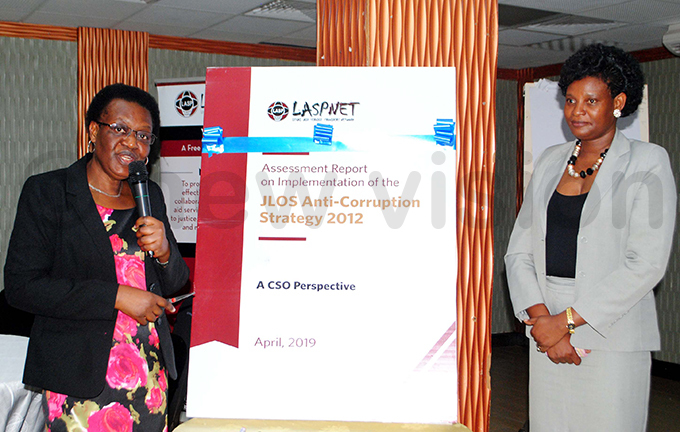IGG raises skepticism on court video conferencing
"It is going to reduce the costs of transporting suspects for mention in courts but they need to ensure that the system is effectively used to serve its purpose"
The Inspector General of Government (IGG) has raised scepticism over whether the recently introduced video conferencing facilities in court will not fuel corruption.
Irene Mulyagonja, advised that the judiciary needs to come up with a system to effectively manage the automation system on prisons side so that it is not abused.
"It is a good system and I am not against it. It is going to reduce the costs of transporting suspects for mention in courts but they need to ensure that the system is effectively used to serve its purpose. That is why they need to look at the other side of automation," she noted.
Mulyagonja made the remarks in an interview with New Vision, during the launch of the assessment report on the implementation of the Justice Law and Order Sector (JLOS) Anti-Corruption Strategy 2012 at Hotel Africana.
"You must ensure suspects appear on the screen and you see them. We must ensure it does not turn into a cash cow. It is very possible it can also become a cash cow," she noted.
The assessment was done by the Legal Aid Service Providers Network (LASPNET), funded by Democratic Governance Facility (DGF), focusing on three institutions within JLOS including; Uganda Human Rights Commission (UHRC), the Judiciary and the Police, and their action plans to prevent and detect corruption, and punishing of the offenders.
 Mulyagonja and the LASPNET executive director Sylvia Mukasa launching the assessment report at Hotel Africana. Photo by Mary Kansiime
Mulyagonja and the LASPNET executive director Sylvia Mukasa launching the assessment report at Hotel Africana. Photo by Mary Kansiime
Mulyagonja said corruption is a big problem and a complicated vice which needs to all institutions fighting corruption to coordinate.
"The biggest problem is lack of coordination. We need more partners to join in the fight because it requires various ways on how to deal with it. I know there many experts who can give us better approaches," he noted.
She noted that all institutions need to domesticate the national strategy to come up with their own action plans to deal with the problem internally among their staff.
"In my department; I have a unit which investigates those who are reported. You know we are all human beings. Last year, I prosecuted some of my officers and they were sent to prison. All those with corruption complaints against my officers should write to me," Mulyagonja noted.
The executive director LASPNET, Sylvia Mukasa, said only three institutions including the Police, UHRC and the Judiciary had put in place action plans by February 2018, and focused on their impact towards fighting corruption.
The strategies focused on the reduction of corruption-related complaints, reduction in audit queries of institutions and issues of improved service delivery, especially reducing delays on the handling of cases.
The report shows an increase in complaints related to corruption at the Judicial Service Commission with an increase from 159 (2016/17) to 550 (2017/18) and an increase at the Police Professional Standards Unit from 159 to 179.
The report recommends for more funding of the various institutions to effectively do their work, amend form 18 that is used to offer Police bond and offer more training for investigators of corruption cases among others.
The EU head of section, governance and human rights, Thomas Tiedemann, asked the government to increase resources to institutions fighting corruption and operationalise the policy on asset recovery from offenders.